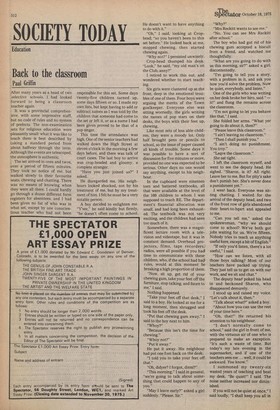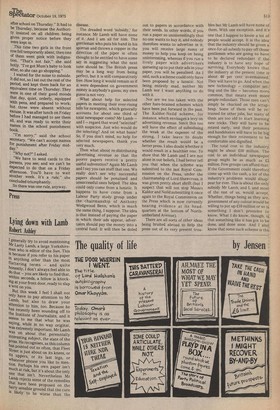Education
Back to the classroom
Paul Griffin
After many years as a head of two selective schools, I had looked forward to being a classroom teacher again.
It was a provincial comprehensive, with some impressive staff, but no code of rules and no system of prefects. The non-examination sets for religious education were pleasantly small: what it was like to teach them is best described by taking a standard period from about halfway through the term. Although the events are telescoped, the atmosphere is authentic.
The set arrived in ones and twos, over a period of fifteen minutes. They took no notice of me, but walked slowly to their favourite seats, chewing and chatting. There was no means of knowing when they were all there. I could hardly go through a dozen different form registers for absentees, and I had been given no list of who was in what set, except by one conscientious teacher who had not been responsible for this set. Some days twenty-five children turned up, some days fifteen or so. I made my own lists, but kept having to add or subtract names as I was told by the children that someone had come to the set or left it, or as a name I had been given proved to be that of a pop singer.
This time the attendance was high.. One of the senior teachers had walked down the High Street at eleven o'clock in the morning a few days before, and there was talk of court cases. The last boy to arrive was crop-headed and gloomy, a complete stranger.
"Have you just joined us?" I asked.
He disregarded me. His neighbours looked shocked, not by his treatment of me, but by my treatment of him. I felt he must be a very notable person.
A boy decided to enlighten me. "Y'see," he said kindly but firmly, "he doesn't often come to school. He doesn't want to have anything to do with it."
"Oh," I said, looking at Crophead; "so you haven't been to this set before." He looked back at me, stopped chewing, then started chewing again.
"Why not?" I persisted unwisely.
Crop-head thumped his desk. "Look," he said, "my old man's on the Club, anny?"
I retired to work this out, and wondered whether to start teaching.
Six girls were clustered up at the front, deep in the emotional troubles of one of them. Four boys were arguing the merits of the Town goalkeeper. Everyone else was sitting worriedly, the girls writing the names of pop stars on their desks, the boys with their feet up, chewing.
Like most sets of less able children, they were a moody lot. Only half brought pens or pencils to school, so the issue of paper caused all kinds of trouble. Some days it was possible to have a sort of discussion for five minutes or more, provided no one was expected to be serious. Other days no one would say anything, except to his neighbour.
In the cupboard were nineteen torn and battered textbooks, all that were available at the level of the 160 children to whom I was supposed to teach RE. The department's financial allocation was small, and had long been exhausted. The textbook was not very exciting, and the children had seen too much of it.
Somewhere, there was a magnificent lecture room with a television and videotape, but it was in constant demand. Overhead projectors, films, tape recorders,1 radios, were all possible if you had time to communicate with these: children, who, if the school had had' rules, would at this moment be breaking a high proportion of them.
"Now, sit up, get rid of your chewing gum, take your feet off the furniture, stop talking, and listen to me," I said.
Nothing happened,
"Take your feet off that desk," I said to a boy. He looked at me for a long moment, then shrugged and took his feet off the desk.
"Put that chewing gum away," I said to the boy next to him. "Whoy?"
"Because this isn't the time for chewing."
"Whoy not?"
"Put it away."
He put it away. His neighbour had put one foot back on the desk.
"I told you to take your feet off that."
"Oh, didyer? I forgot, dinni?"
"This morning," I said in general, "we're going to talk about something that could happen to any of you."
"May I leave early?" asked a girl suddenly. "Please. Sir." "Why?"
"Mrs Reckitt wants to see me." "No. You can see Mrs Reckitt after school," The boy who had got rid of his chewing gum accepted a biscuit from a friend, and watched me thoughtfully.
"What are you going to do with us this morning, sir?" asked a girl, discontentedly.
"I'm going to tell you a story, with a problem in it, and ask you how you'd solve the problem. Now be quiet, everybody, and listen."
One of the girls who was writing on her desk broke her biro, said" — it!" and flung the remains across the classroom.
"I'm not going to let you behave like that," I said.
She folded her arms. "What yer going to do about it, then?"
"Please leave this classroom."
"I ain't leaving no classroom." "Then I shall punish you."
"I ain't doing no punishment. You troy."
"Leqve the classroom."
She sat tight.
I left the classroom myself, and went to see the deputy head. He sighed. "Sharon, is it? All right. Leave her to me, But for pity's sake don't punish her. She's never done a punishment yet."
I went back. Everyone was sitting chatting. I waited for the arrival of the deputy head, and two of the front row of girls abandoned their heart-to-heart and appealed to me.
"Can you tell me," asked the spokeswoman, "why we should come to school? We've both got jobs waiting for us. We're fifteen. Nobody tries to teach us anything useful here, except a bit of English."
"If only you'd listen, there's a lot useful," I said.
"How can we listen, with all those boys talking? Most of our teachers have packed up trying. They just tell us to get on with our work, and we sit and chat."
The deputy head poked his head in and beckoned Sharon, who disappeared demurely.
I stood up and raised my voice. "Let's talk about it, then."
"Talk about what?" asked a boy. "About how you can use the rest of your time here."
"Oh, that!" He returned his attention to his neighbour.
"I don't normally come to school," said the girl in front of me, with the virtuous air of one who is prepared to make an exception. "It's such a waste of time. But today's my late evening in the supermarket, and if one of the teachers sees me ... well, it could be awkward. You know."
I summoned my twenty-six wasted years of teaching and beat my desk. "Be quiet!" I said. The noise neither increased nor diminished.
If you will not be quiet at once," I said loudly, "I shall keep you all in after school on Thursday." It had to be Thursday, because the Authority insisted on all children being given proper notice before they were kept in.
This time two girls in the front row fell temporarily silent; then one of them went pink with indignation. "That's not fair," she said hotly. "I've got Mum's baby to look after, so she can go shopping."
I waited for the noise to subside. It did not, so I sat out the rest of the period, and kept them back for an equivalent time on Thursday. They were in one of their good moods that day, quiet, orderly, equipped With pens, and prepared to work; but three were absent without excuse. It was after lunch on Friday before I had managed to see them all, and was ready to write their names in the school punishment book.
"I'm sorry," said the school secretary. "We can't accept names for punishment after Friday midday."
"Why not?" I asked.
"We have to send cards to the parents, you see; and we can't be expected to do that on a Friday afternoon. You'll have to wait another week. It's a rule," she concluded triumphantly.
So there was one rule, anyway.
vamp



































 Previous page
Previous page